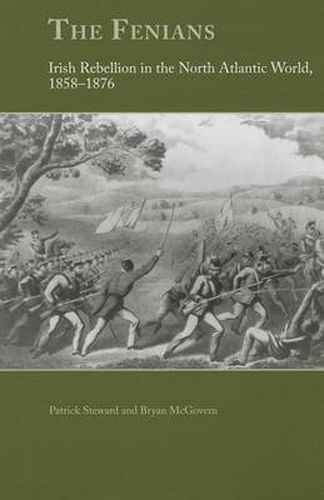Readings Newsletter
Become a Readings Member to make your shopping experience even easier.
Sign in or sign up for free!
You’re not far away from qualifying for FREE standard shipping within Australia
You’ve qualified for FREE standard shipping within Australia
The cart is loading…






Aspirations of social mobility and anti-Catholic discrimination were the lifeblood of subversive opposition to British rule in Ireland during the mid-nineteenth century. Refugees of the Great Famine who congregated in ethnic enclaves in North America and the United Kingdom supported the militant Fenian Brotherhood and its Dublin-based counterpart, the Irish Republican Brotherhood (IRB), in hopes of one day returning to an independent homeland. Despite lackluster leadership, the movement was briefly a credible security threat which impacted the history of nations on both sides of the Atlantic.
Inspired by the failed Young Ireland insurrection of 1848 and other nationalist movements on the European continent, the Fenian Brotherhood and the IRB (collectively known as the Fenians) surmised that insurrection was the only path to Irish freedom. By 1865, the Fenians had filled their ranks with battle-tested Irish expatriate veterans of the Union and Confederate armies who were anxious to liberate Ireland. Lofty Fenian ambitions were ultimately compromised by several factors including United States government opposition and the resolution of volunteer Canadian militias who repelled multiple Fenian incursions into New Brunswick, Quebec, Ontario, and Manitoba. The Fenian legacy is thus multifaceted. It was a mildly threatening source of nationalist pride for discouraged Irish expatriates until the organisation fulfilled its pledge to violently attack British soldiers and subjects. It also encouraged the confederation of Canadian provinces under the 1867 Dominion Act.
In this book, Patrick Steward and Bryan McGovern present the first holistic, multinational study of the Fenian movement. While utilising a vast array of previously untapped primary sources, the authors uncover the socioeconomic roots of Irish nationalist behaviour at the height of the Victorian Period. Concurrently, they trace the progression of Fenian ideals in the grassroots of Young Ireland to its de facto collapse in 1870s. In doing so, the authors change the perception of the Fenians from fanatics who aimlessly attempted to free their homeland to idealists who believed in their cause and fought with a physical and rhetorical force that was not nonsensical and hopeless as some previous accounts have suggested.
$9.00 standard shipping within Australia
FREE standard shipping within Australia for orders over $100.00
Express & International shipping calculated at checkout
Aspirations of social mobility and anti-Catholic discrimination were the lifeblood of subversive opposition to British rule in Ireland during the mid-nineteenth century. Refugees of the Great Famine who congregated in ethnic enclaves in North America and the United Kingdom supported the militant Fenian Brotherhood and its Dublin-based counterpart, the Irish Republican Brotherhood (IRB), in hopes of one day returning to an independent homeland. Despite lackluster leadership, the movement was briefly a credible security threat which impacted the history of nations on both sides of the Atlantic.
Inspired by the failed Young Ireland insurrection of 1848 and other nationalist movements on the European continent, the Fenian Brotherhood and the IRB (collectively known as the Fenians) surmised that insurrection was the only path to Irish freedom. By 1865, the Fenians had filled their ranks with battle-tested Irish expatriate veterans of the Union and Confederate armies who were anxious to liberate Ireland. Lofty Fenian ambitions were ultimately compromised by several factors including United States government opposition and the resolution of volunteer Canadian militias who repelled multiple Fenian incursions into New Brunswick, Quebec, Ontario, and Manitoba. The Fenian legacy is thus multifaceted. It was a mildly threatening source of nationalist pride for discouraged Irish expatriates until the organisation fulfilled its pledge to violently attack British soldiers and subjects. It also encouraged the confederation of Canadian provinces under the 1867 Dominion Act.
In this book, Patrick Steward and Bryan McGovern present the first holistic, multinational study of the Fenian movement. While utilising a vast array of previously untapped primary sources, the authors uncover the socioeconomic roots of Irish nationalist behaviour at the height of the Victorian Period. Concurrently, they trace the progression of Fenian ideals in the grassroots of Young Ireland to its de facto collapse in 1870s. In doing so, the authors change the perception of the Fenians from fanatics who aimlessly attempted to free their homeland to idealists who believed in their cause and fought with a physical and rhetorical force that was not nonsensical and hopeless as some previous accounts have suggested.